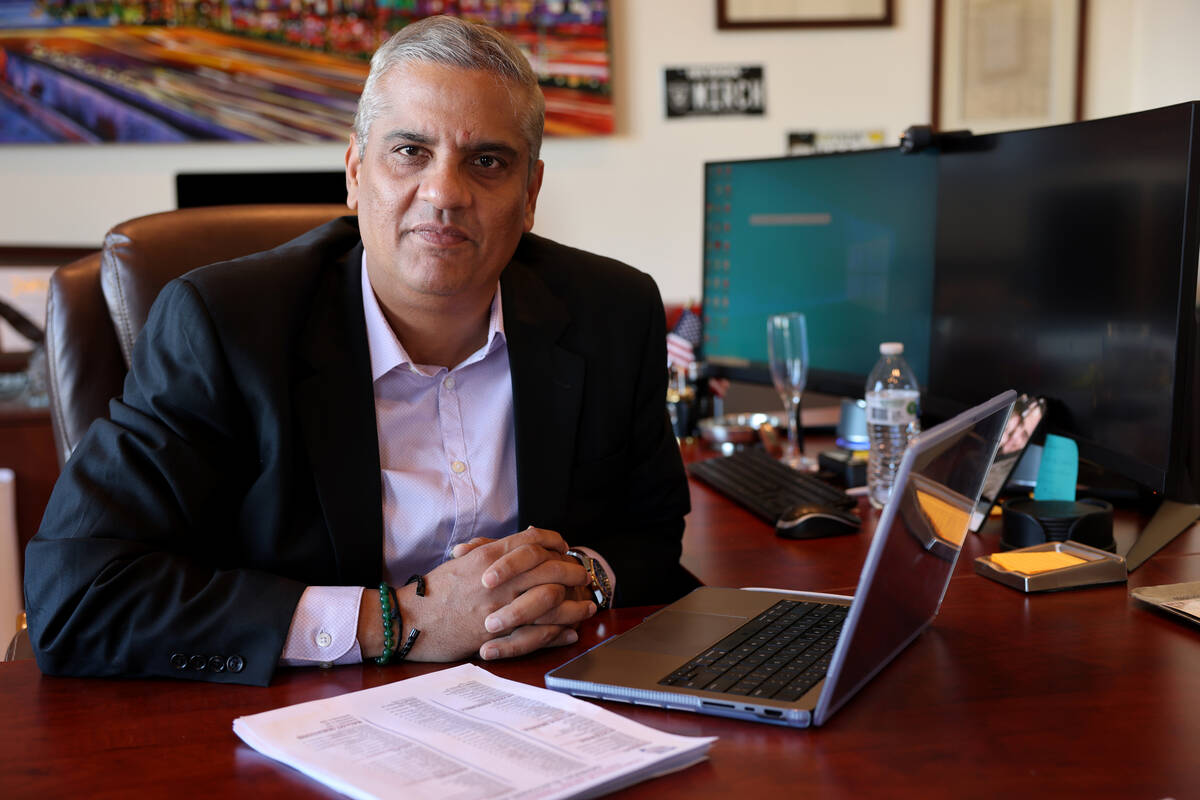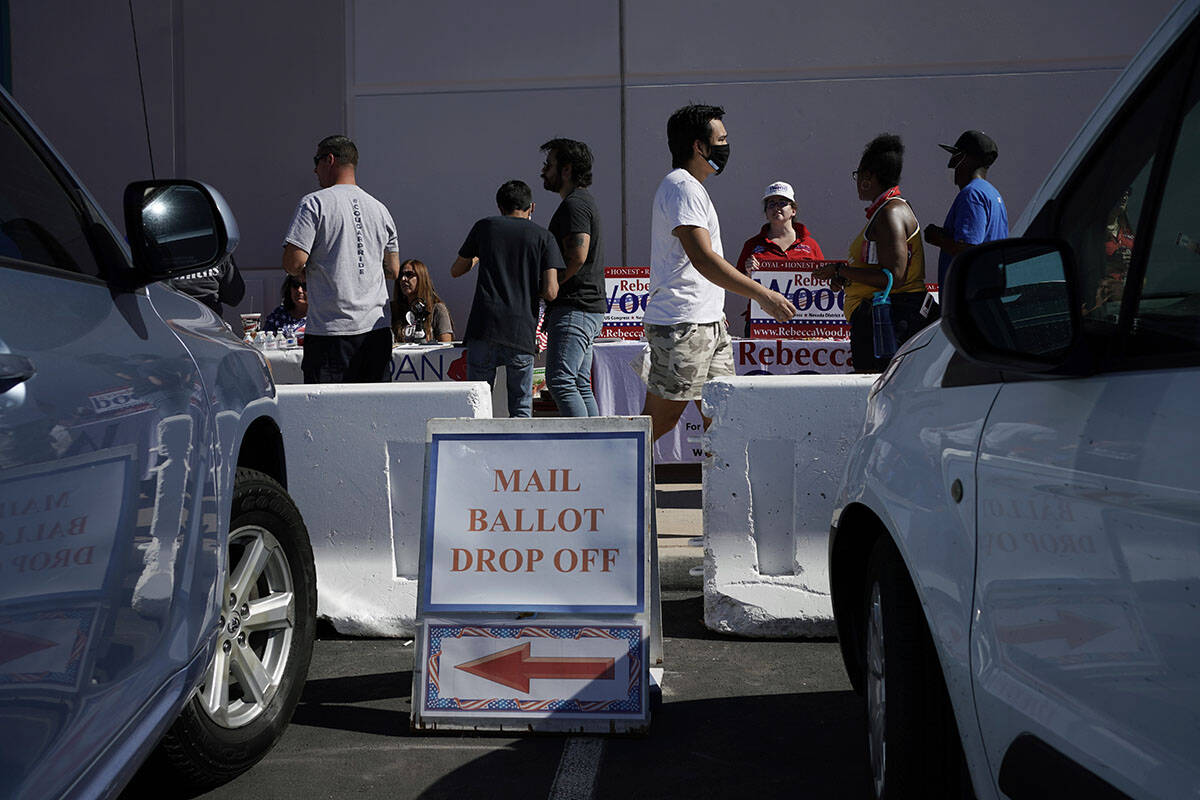Nevada’s largest voting bloc can’t vote in a primary. This initiative could change that
Nonpartisan voters make up the largest voting bloc in Nevada, yet they cannot participate in the primary election process. A ballot initiative is trying to change that, and it only needs to go through one more hurdle to take effect in 2026.
Ballot Question 3 — the ranked choice ballot and nonpartisan primary measure that passed in 2022 with close to 53 percent of the votes — would allow all voters to participate in the primary process, regardless of party, with the top five candidates moving on to the general election, no matter their political affiliation.
Nonpartisans made up about 32 percent of active registered voters in October, replacing Democrats as the largest voting bloc. Another 7 percent of Nevada voters are registered with a third or minor party, bringing the total of those often unable to participate in a primary to nearly 40 percent, according to the secretary of state’s office.
“It is incredibly frustrating to be a nonpartisan and not have a voice,” said Ash Mirchandani, a registered nonpartisan and a Las Vegas resident who founded the Coalition of Independent Nevadans, an organization formed to provide a neutral platform for the rising number of nonpartisan voters and encourage candidates to appeal to the more moderate voter.
‘Lesser of two evils’
The ballot initiative aims to not only allow all voters to participate in the primary process but to encourage candidates to appeal to the more moderate voter throughout the election cycle.
“More and more people are feeling like they’re being forced to vote between the lesser of two evils. People feel disenfranchised,” said Mike Draper, director of communications for Nevada Voters First, the PAC behind the initiative.
Draper said candidates are incentivized to play to their political base — either the far right or the far left — rather than to play to the majority of voters. The country is seeing more division and less compromise, and the current election system has become monopolized by party power, he said.
“This is an opportunity for us to begin to restore that power to the people,” Draper said.
Nevada Voters First has seen a lot of outside support. In one 2022 fundraising quarter, it received more donations than any candidate who was running for office. At the end of 2022, the PAC raised almost $3.5 million from October through December and had nearly $22.3 million on hand, it reported to the secretary of state’s office.
Final Five Fund, a PAC supporting the implementation of nonpartisan primaries and ranked choice voting measures across the country, donated nearly $2 million to the cause, but some local groups also have shown their support. Station Casinos, for instance, donated $50,000 in October 2022.
Confusion and suppression?
Those who are against the initiative — including some progressive coalitions and both of the major parties — argue that it would be too confusing for voters and could result in voter disenfranchisement.
In addition to instituting a nonpartisan primary where Democrat, Republican and other candidates all appear in one primary, the measure also calls for a ranked choice ballot system. In the general election, the top five candidates who made it through the primary would be listed, and voters would rank them from favorite to least favorite.
If one candidate earned more than 50 percent of the general election votes, that candidate would win. If not, the candidate with the least number of first-choice votes is eliminated, and that candidate’s votes would get distributed to the second-choice candidates. The ballots then would be adjusted and the votes would again be tabulated, until one candidate gets 50 percent and is declared the winner.
The ballot measure would not apply to presidential elections. Instead, it would affect Nevada’s U.S. Senate and other congressional races, as well as governor and other statewide races.
Nevada State Democratic Party Chairwoman Daniele Monroe-Moreno said not only would it be confusing, but that confusion would result in an increased number of ballots getting rejected and in some ways suppress voter turnout in communities of color.
“Voters are smart, voters can adapt, but we’ve also given voters a lot to adapt to,” she said, such as the automatic voter registration system and the expansion of mail-in ballots in 2021.
Ranked choice voting is used in multiple cities and some states around the country, such as Alaska and Maine. Some studies where ranked choice has been implemented have shown that voters who were white and more affluent turned out at a higher rate and were more likely to use the opportunity to rank candidates.
With Nevada’s same-day voter registration, nonpartisan voters could show up to a primary election and change to a major party in order to participate in the primary, Monroe-Moreno said.
The assemblywoman said it is incumbent on candidates to make sure voters do not feel disenfranchised and to get to know the constituents they will represent, and she disagrees with the idea that the current system forces candidates to appeal either to the far left or the far right.
“I do speak to my Democratic voters. But I also communicate with my nonpartisan voters and Republican voters because as an elected official, I represent everyone. And I can’t do that job without communicating with everyone,” Monroe-Moreno said.
She said Democrats have focused on making voting more accessible and more convenient in the state. She does not believe an initiative like this is necessary for Nevada.
“I think implementing the ranked choice voting in Nevada now would only take us backwards,” Monroe-Moreno said.
Nevada Republican Party Chairman Michael McDonald called the ranked voting process convoluted and said it interferes with political parties’ rights to determine their nominees. He said the instant run-offs that occur when there is no clear winner in the first round could make it take a long time to determine the results.
“(Ranked voting) will confuse voters, further threaten voter confidence and will cause votes to be thrown away,” he said in an email. “What it doesn’t do is represent the majority vote or increase participation or fairness.”
Mirchandani thinks the initiative would level the playing field and open it up to candidates who otherwise would not have a shot, and would encourage more nonpartisans to run for office.
“This is a step in the right direction,” he said.
Contact Jessica Hill at jehill@reviewjournal.com. Follow @jess_hillyeah on X.












